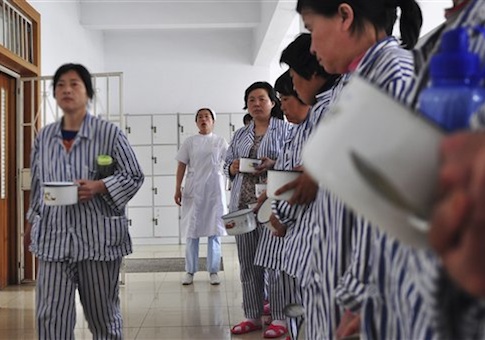China Commits More Dissidents To Psychiatric Detention
Soviet-era practice also revived in Russia
BY:

Chinese authorities continue to forcibly commit political dissidents to psychiatric detention, a practice of the former Soviet Union that has been widely condemned by human rights groups and the United Nations.
Chinese Human Rights Defenders (CHRD)reports that two more individuals, a blogger and an activist, have been involuntarily committed to mental hospitals. Xing Shiku, a petitioner and government critic, has been involuntarily detained at a psychiatric hospital since February 2007.
Businessman and online commentator Shi Genyuan was seized from his home in June and placed in the mental health ward of a hospital in the southeastern Fujian Province. Shi was critical of the government in his online posts.
In May 2013, officers arrested Shi and accused him of “inciting subversion of state power”—a charge frequently leveled at dissidents—with his writings. Authorities completed a psychiatric evaluation before releasing him in August of last year, which they apparently used to confine him to a mental institution this year.
Security officers have since refused to release Shi. His family has reportedly stopped pressing for his release and declined to hire a lawyer after receiving threats.
Under China’s 2013 Mental Health Law, involuntary psychiatric detainees are deprived of legal rights and assigned a “guardian.” The guardians assigned to the dissidents are typically local officials, and only they can order their release.
CHRD International Director Renee Xia previously said forced psychiatric detention “violates basic human rights” and should be ended immediately.
“Forced psychiatric commitment of individuals for peacefully expressing their views remains a serious problem in China today,” she said.
The other detained activist, Song Zaimin, has been confined in Pinggu Psychiatric Hospital in Beijing, CHRD says. Song has faced years of persecution after participating in the 1989 pro-democracy movement that was brutally suppressed at Tiananmen Square.
The United Nations Working Group on Arbitrary Detention (WGAD) determined in May that Xing Shiku’s psychiatric confinement was “arbitrary.” Xing has allegedly been tortured during his detention and denied medical care for several health problems.
“In this case, the Working Group considers that Mr. Xing has been deprived of his liberty for over seven years because of the peaceful expression of his views,” the group wrote in its opinion.
While CHRD says some of those detained in recent years might have mental disabilities, the group highlighted 40 individuals in a 2012 report who were committed as a consequence of their petitioning and human rights activism.
Central government rules require local officials to meet a quota of committing two out of every one thousand people who allegedly have “serious mental illnesses,” according to CHRD. That incentivizes police to detain dissidents in psychiatric facilities.
The U.S. State Department previously said it was “concerned about the involuntary commitment of dissidents to psychiatric institutions.”
“We call on Chinese authorities to release all persons detained for peacefully expressing their views, remove restrictions on their freedom of movement, and guarantee them the protections and freedoms to which they are entitled under China’s international human rights commitments, including the freedoms of expression and peaceful assembly,” a department spokesperson said in an emailed statement.
Russian President Vladimir Putin’s government has also recently revived the Soviet-era practice of using psychiatric confinement to punish political dissidents, according to Russian journalist and democratic activist Vladimir Kara-Murza.
No comments:
Post a Comment
Comments always welcome!